World War One: Documentaries
91�ȱ� Documentaries marking the centenary of World War One.
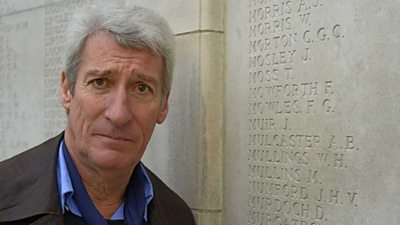
91�ȱ� One
Opening the World War One commemoration season on the 91�ȱ� and produced in partnership with the Open University, landmark new documentary series Britain’s Great War, presented by Jeremy Paxman, explores how Britain and the lives of British people were transformed by the Great War.
There had never been a war like it. It was the first ‘total war’ and it blew apart the certainties on which British society rested. Focusing on extraordinary personal stories to illuminate often cataclysmic events, each episode charts a different stage of the war: from initial optimism; to frustration; to the exhausted, poignant celebration of victory.
It was the first war in British history in which men were conscripted to fight, civilians had their homes bombed, and every family feared a knock on the door bringing terrible news. Governments took for themselves powers they would never have imagined possible. Women did the jobs of men and found their lives transformed. Though the conflict brought terrible grief and hardship, Jeremy shows how support for the war remained solid even in its darkest days.
It was won, not only by the skills of men in battle, but also by the capacity of the nation to turn itself into a war machine. The series features an interview with a woman of 105, who recalls the German shelling of Hartlepool in 1914.
Out of the furnace of the most devastating war the world had ever seen, modern Britain was born.
Jeremy Paxman says: "The trouble with so much of our understanding of World War One is that it is seen through the prism of the prejudices of the hundred years which have followed it. It’s an amazing and important story which deserves to be viewed afresh."
Britain’s Great War will also be specially re-versioned for use in schools by the 91�ȱ� Learning team as part of the 91�ȱ�’s extensive digital resource for the World War One Centenary.
Britain’s Great War was co-produced with The Open University.
91�ȱ� Productions / The Open University - 4x60
AT
Teenage Tommies
91�ȱ� Two
In this moving tribute to the teenage heroes of the Great War, Fergal Keane unearths the most powerful stories of Britain’s Boy Soldiers. With as many as 250,000 boys under the age of 18 having served in the British Army during World War One, and with every tenth volunteer lying about his age, Fergal looks to find out what made them enlist. Was it motivated by patriotism, or the spirit of adventure?
Fergal follows the children into the trenches, to see how they coped with the reality of war. He explores how, as the casualties began to mount, a movement grew in Britain to get them home. Fergal also meets the children and grandchildren of these former boy solders, uncovering heartrending, but often uplifting, stories and taking them on an emotional journey to the places where their ancestors trained and fought.
91�ȱ� Productions, Northern Ireland - 1x60 minutes.
SH8
The Story Of Women In World War One
91�ȱ� Two
When war broke out in 1914 and a generation of men went off to fight the world changed forever. Kate Adie reveals in this fascinating documentary for 91�ȱ� Two what an extraordinary impact the fighting had on the lives of British women – not just as wives and mothers, but as a visible force in public life, for the very first time.
From transport to policing, munitions to sport, entertainment, even politics, women stepped into the breach and became a part of the war machine, acquiring their own rights and often an independent income.
91�ȱ� Two’s The Story of Women in World War One documents the achievements of women during World War One which in turn paved the way to fairness and equality for the women of Britain’s future.
91�ȱ� Productions – 1x60 minutes
AT
Royal Cousins At War
91�ȱ� Two
This series tells the story of how European royal relatives, despite ties of blood and marriage, ended up at war with each other. It explores how World War One brought the continent to its knees, resulting in the demise of many of the Royal Houses of Europe. For the people involved, including King George V, Tsar Nicholas II and Kaiser Wilhem II, the tide of history brought immense change, tragedy and personal humiliation.
The first part of this series looks at how, despite the hope that the spread of Queen Victoria’s progeny across the royal houses of Europe would foster peace and good government, there were, in fact, escalating tensions between the members of Queen Victoria’s family. The personal tensions between Edward VII and Wilhelm II encapsulated and exacerbated the rivalry between their respective countries.
Part two explores how, in the crucial years after the death of Queen Victoria in 1901, the royal family of Europe not only failed to prevent war, but actively contributed to its onset, hastening their own demise. As new forms of government emerged, the interconnected royal dynasties, the archaic monarchies of Europe, were forced to adapt, or be overthrown.
Blakeway Productions - 2x60 minutes.
SH8
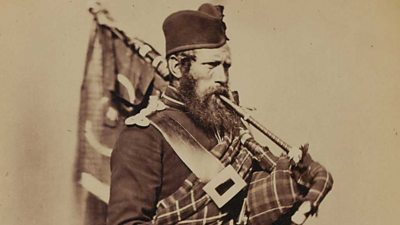
91�ȱ� Two
For 500 years or more, Scottish regiments advanced and attacked to the tune of the pipes. Two-and-a-half thousand pipers served in the Great War; men from Scotland, Ireland, Canada, Australia and New Zealand. Within a year a thousand of them were dead.
This film brings together stories of unparalleled bravery as descendants of World War One pipers visit the Somme and Gallipoli, the battlefields where their ancestors, unarmed, piped their comrades ‘over the top’.
With behind-the-scenes testimony from serving soldiers, this programme uncovers why these centuries-old tunes, remembering ancient battles, still have a relevance today.
91�ȱ� Productions, Scotland - 1x60 minutes.
HM
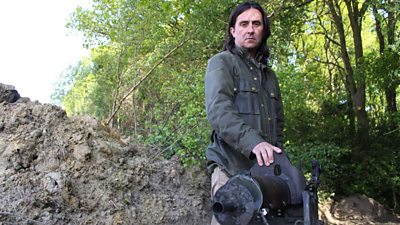
91�ȱ� Two
In the Great War, friends signed up together and served together, shoulder to shoulder. One burst of machine gun fire could hit scores of men from the same village, farm, town or factory.
Neil Oliver describes the dreadful human cost of a weapon that could fire a devilish 666 rounds per minute – the Maxim Gun.
It had been invented by an American living in London. Yet it was the German army who built them in great numbers and who learned to deploy them with a chilling mathematical precision.
The science of the gun is interwoven with the story of a small company of British soldiers that would come to face these horrific weapons.
91�ȱ� Productions, Scotland - 1x60 minutes.
HM
I Was There: The Great War Interviews
91�ȱ� Two
91�ȱ� Two’s 'I Was There: The Great War Interviews' is a moving tribute to the human face of war, based on interviews that the 91�ȱ� filmed 50 years ago for the landmark series The Great War. Large parts of the original interviews were never broadcast and the original film reels were deposited at the Imperial War Museum.
Featuring the most powerful first-hand accounts from over 250 interview recordings with both former soldiers and civilians, I Was There: The Great War Interviews is not a film about military history but a film about the poignant personal experience of war. From everyday life in the trenches and death-defying dog fights in the air, to fraternisation with the enemy and the actual experience of killing, this is the Great War as visceral, lived experience, with eye-witnesses still spry, alert and passionate when telling their stories.
To sit alongside I Was There: The Great War Interviews, 91�ȱ� Four Collections will publish a selection of the original interview recordings in their entirety, permanently available to view on 91�ȱ� iPlayer.
I Was There: The Great War Interviews will also be specially re-versioned for use in schools by the 91�ȱ� Learning team as part of the 91�ȱ�’s extensive digital resource for the World War One Centenary.
91�ȱ� Productions, Northern Ireland - 1x60 minutes.
AT
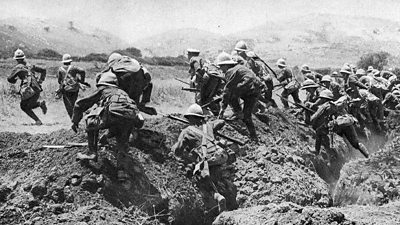
91�ȱ� Two
91�ȱ� Two’s Gallipoli presents a fresh look at the British Empire’s most humiliating episode of World War One, the Gallipoli campaign.
The Battle of Gallipoli is often cited as one of the major failures of the Allies during the war between 1915 and 1916. This film reveals the story of the troubles and finger-pointing that went on behind the scenes in Whitehall during the campaign; how World War One was fought not only at the battle front and the generals’ headquarters but also in the government corridors of power and, increasingly, on the front pages of newspapers.
Drawing on accounts and testimony from leading players including Winston Churchill, and Lord Kitchener to the soldiers on the ground; and featuring an exclusive interview with Rupert Murdoch about his father, Keith Murdoch’s, role in bringing the disastrous Gallipoli campaign to an end, the film is a timely re-evaluation of a campaign which has long been obscured by both myth and legend.
Blakeway Productions - 1x60 minutes.
AT
The World's War
91�ȱ� Two
Historian and film-maker David Olusoga challenges people’s understanding of World War One, telling it from the perspective of those of who made it a truly global conflict: the hundreds of thousands of Indian, African and Asian troops and ancillaries who fought and died alongside Europeans.
Drawing on personal stories and testimonies and illustrated with rarely seen stills, archive and location photography, The World’s War dissects how the complexities of Empire and the hypocrisies of race played out against the background of a global struggle for dominance.
Part one depicts how, when the European powers went to war, the British and the French drew immediately on the military resources of their respective empires. Sikhs, Gurkhas, Garhwalis and Pathans from the British Raj and Spahis, Zouaves and Senegalese from French North and West Africa were thrown into the front lines and were among the first to experience the hell that was trench warfare. Though billed as a ‘white man’s war’, the conflict quickly became a truly global event, fought by multi-racial, multi-ethnic armies.
Part two explores how Germany enrolled the Muslim peoples of North Africa and the Middle East to join a Jihad against the allies. In Germany, Muslim POWs and deserters held in special camps were indoctrinated to see the German emperor as a lover of Islam and a supporter of national independence wherever the British or French flags flew. Meanwhile, in East Africa legendary German General Paul von Lettow-Vorbeck led an army of African troops in a bitter insurgency war against the allies, a forgotten war that cost the lives of hundreds of thousands of black Africans.
Throughout this series, interviews with modern military commanders from across the world along with a host of experts, including authors and economic historians, reveal why the war involved so many different peoples, and how much they contributed in money and raw materials as well as men.
91�ȱ� Productions - 2x60 minutes.
SH8
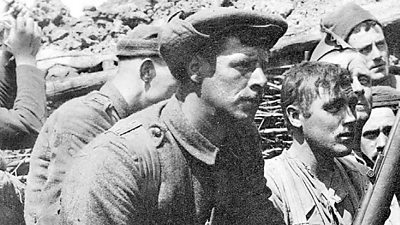
91�ȱ� Four
This new one-hour 91�ȱ� Four documentary reveals the extraordinary stories behind the photographs taken by British and German soldiers during World War One.
Tens of thousands of British and German soldiers marched off to war in 1914 with VPKs (Vest Pocket Kodaks) concealed in their coats, thinking the war would be a great adventure and wanting photographs to remember it by. The pictures they took provide a unique, uncensored insight into the lives of soldiers during the war. They show the day-today routine of life in the trenches and capture the spontaneity of life behind the lines. Some feature advances into no man’s land, and dead bodies of friends or prisoners they captured. Unlike the official war photographs, nothing was off limits.
Families in Britain and Germany who hold the best collections of photographs share the stories of longlost relatives; and leading historians assess the significance of the soldiers’ photographs and explain how they provide a fresh view of the war, including the relationship between Tommy and Jerry.
Testimony Films - 1x60 minutes.
AT
Forgotten Heroes - Indian Army In The Great War
91�ȱ� Radio 2
91�ȱ� Radio 2 tells the forgotten story of the estimated 1.5 million men from the Indian Army who fought valiantly in the Great War through a series of letters written by the soldiers to family and friends back home.
Unique Productions – 1x60 minutes.
AF2
Documentaries on 91�ȱ� Radio 1
91�ȱ� Radio 1 is planning a range of documentaries to reflect the World War One anniversary in a way most relevant to a young audience. The network will be looking to draw parallels between contemporary experiences and those 100 years earlier, both for those involved in the fighting and also those affected more widely by conflict.
AFG
Keep The 91�ȱ� Fires Burning
91�ȱ� Radio 2
Keep The 91�ȱ� Fires Burning tells the story of the flamboyant Welsh composer Ivor Novello and the song that made his name during World War One.
TBI Media - 1x60 minutes.
AF2
1914 - Day By Day
91�ȱ� Radio 4
Historian Margaret MacMillan presents a daily programme from June to August 2014 on 91�ȱ� Radio 4 chronicling the road to war in 1914, broadcast every day between the anniversary of the assassination of Archduke Franz Ferdinand through to the first week of the conflict.
Each programme pieces together sources from that day in history, giving a picture of the world from the perspective of the people as they lived it. The series draws together newspaper accounts, diplomatic correspondence and private journals, from the telegrams between the Kaiser and the Tsar through to the diary entries of ordinary people.
Listeners will be able to experience almost in real time the development of the crisis while also gaining an insight into the wider context of the world in 1914, including the suffragettes, the threat of civil war in Ireland, the sensational trial of Madame Caillaux in France and the development of aviation.
Margaret MacMillan is professor of international history at Oxford, where she is also the warden of St Antony’s College. Her forthcoming book on 1914 has been longlisted for the Samuel Johnson Prize. Her previous work, Paris 1919: Six Months That Changed The World, won the Samuel Johnson Prize, the PEN Hessell-Tiltman Prize and the Duff Cooper Prize, and was a New York Times Editors’ Choice.
A Somethin’ Else production - 42x4 minutes.
CD3
How Britain Went To War
91�ȱ� Radio 4
Historian of government Peter Hennessy tells the secret story of how Britain planned for war in the years leading up to 1914.
Drawing on official plans and intelligence reports, he reveals how Whitehall prepared the initial detailed plans for going to war. He examines the official expectations about the likely nature of a war in the leadup to 1914, reveals some of Whitehall’s hidden tensions and assesses the effectiveness of their plan.
In August 1914, the possibility of conflict became a stark reality and Hennessy considers what was going through the minds of ministers and their advisers as the Cabinet agonised over taking Britain to war, while outside No. 10 the crowds cheered.
91�ȱ� News Productions.
AH2
Month Of Madness
91�ȱ� Radio 4
Christopher Clark, Professor of History at Cambridge University, presents a five-part series on the outbreak of World War One. He explains the reasons for the onset of hostilities from the perspective of the key centres of action and decision making – Sarajevo, St Petersburg, Berlin, Paris and London.
Professor Clark is an acknowledged authority on the causes of the conflict and an acclaimed author of historical works on the rise of Prussia and the onset of the war. In this series he disentangles one of the most complex events in history, clarifies controversy and draws insightful parallels with our present fractured world. By highlighting the political and strategic anxieties of the great powers of the time, Clark shows how the assassination of an Archduke in the provincial capital of Sarajevo led to the global catastrophe of World War One.
Blakeway Productions - 5x15 minutes.
CD3
Voices Of The First World War
91�ȱ� Radio 4
This documentary series tells the story of the war through the experiences of those who fought it and lived through it, and will be broadcast in short seasons throughout the commemorative period.
The series, made in partnership with Imperial War Museums, brings together two major sound archive collections for the first time. It reaches beyond national borders, and features voices from every part of the conflict.
Many of these remarkable recordings were made not for immediate use or broadcast, but because it was felt that this diminishing resource, that could never be replenished, would be of unique value in the future.
This series is the legacy of that project, and will broadcast many of these recordings for the first time.
91�ȱ� Productions, Wales - 10x15 minutes per year.
CD3

91�ȱ� Radio 2
Jeremy Vine hosts a real-time journey through the events, voices and music of World War One, going back in time to 1914 to experience the war as it happened.
Jeremy presents events as they unfold: hearing breaking news from the continent and at home (taken from the newspapers of the time); talking to the ‘real people’ of 1914 (actors giving voice to genuine historical accounts); and hosting round-table discussions with contemporary experts on everything from rationing to trench foot.
All this will be sound-tracked by music of the time – including army marching band numbers, classical compositions, and the tongue-in-cheek music hall melodies that would have been most familiar to a 1914 audience.
Real Time World War One will be a completely immersive experience for the 91�ȱ� Radio 2 daytime audience.
Unique Productions – 15x15 minutes.
AF2
The War That Changed The World
91�ȱ� World Service / 91�ȱ� Radio 3
One hundred years ago World War One set the course for the 20th century; for the countries that took part nothing would be quite the same again.
The 91�ȱ� World Service and 91�ȱ� Radio 3 have partnered with the British Council for a series of events looking at the impact of the war from the points of view of countries which fought. This series, presented by historian Amanda Vickery, will be a globalised history of the effect of war with each edition recorded in a different location with an audience of local people and a panel of historians from that country. Every programme explores a different theme and will also include a personal essay performed by a cultural or literary figure from that country about what the legacy of the war meant to them. That essay will be broadcast as a separate programme on Radio 3.
The series explores heroism with audiences and historians in Verdun. In the Red Fort in Delhi Amanda and guests discuss imperialism, how it shaped the war and the effect the war had on empire. Travelling to the USA, the topic is isolationism and how it resonates in America today.
The series also visits St Petersburg, Gallipoli, Amman and Dresden, and, from the atrium of the Imperial War Museum in London, talks about personal experiences of the war and the effect that keeping quiet about what happened had on history.
91�ȱ� World Service Productions - 8x53 minutes.
Radio 3 - The Essay - 8x15 minutes.
MC4
India's Forgotten War
91�ȱ� World Service
India contributed an estimated 1.5 million soldiers to World War One, the highest of all the colonial British, German and French empires. It was also the largest South Asian migration to Europe at any time, but has been largely neglected in both European and South Asian histories. Anita Rani tells the neglected story of India’s own response to the Great War, and discovers the remarkable records which survive of hundreds of thousands of troops who were uprooted from remote Punjabi villages, to fight a war 6000 miles away.
A Freewheel production.
SW
I Don't Remember The War
91�ȱ� World Service
The centenary of World War One offers a chance to reflect on the huge and very real gulf that separates young people from the war, regardless of efforts of remembrance. In I Don’t Remember The War on the 91�ȱ� World Service, writers aged 35 or under, from around the world, explore their ancestors’ involvement in the Great War.
By delving into their own family history, the young writers’ narratives will form a collection of audio essays which help bridge the gap between this war and the modern world, and to question what the values and sacrifices of the war really mean today.
A Cast Iron Radio production.
SW